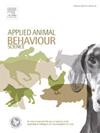短期影响还是长期影响?判断偏差任务中情绪和情绪对猪决策的影响
IF 2
2区 农林科学
Q1 AGRICULTURE, DAIRY & ANIMAL SCIENCE
引用次数: 0
摘要
判断偏差任务(JBT)是一种很有前途的动物情感状态的代理测量方法,是动物福利科学及其他领域的一个新兴领域。然而,目前尚不清楚判断偏差主要是受长期情绪、短期情绪还是两者的综合影响。本研究旨在系统地解开情绪和情绪诱导治疗对猪在JBT上的决定的影响,使用积极的人猪互动作为影响操纵。在三个批次中,36头猪接受了主动启动的空间Go/No-go任务的训练。在为期三周的训练和测试期间,12头猪每天与熟悉的人进行5分钟的积极互动(MoodPlus),而其余24头猪没有接受这种治疗(MoodMinus)。当猪在JBT上进行测试时,所有12只MoodPlus和12只MoodMinus猪都接受了三次测试,在此之前进行了五分钟的积极互动(EmoPlus)和三次没有积极互动的测试(EmoMinus)。其余12头MoodMinus猪被分配到对照组,不接受任何特定的积极互动治疗。30头猪(83% %)达到了学习标准,并在六个测试阶段进行了测试。所有处理组的猪对所有模糊线索都表现出高度“乐观”的反应,导致天花板效应,这可能掩盖了潜在的处理差异(除线索类型外的所有效应:χ12≤1.75,p≥0.19)。研究结束时的人类接近和回避测试结果以及对猪在EmoPlus会话期间的行为分析表明,在研究过程中,所有猪(独立于治疗)都与实验者建立了积极的关系。这些结果表明,当训练需要定期与人接触时,积极的人与动物互动可能不是JBT的理想治疗方法。在EmoMinus组中,MoodMinus组的猪比Control组的猪更倾向于“乐观”(χ21 = 3.58, p = 0.06),这可能表明EmoPlus组对EmoMinus组有延续效应。我们呼吁未来的研究采用不同于人与动物相互作用的治疗方法,以系统的方式实施长期和短期干预,以理清情绪和/或情感对判断偏差的影响。本文章由计算机程序翻译,如有差异,请以英文原文为准。
Short- or long-term affect? Disentangling the effects of emotion and mood on pigs’ decisions on a Judgement Bias Task
The Judgement Bias Task (JBT) is a promising proxy measure of animals’ affective states, a growing field in animal welfare science and beyond. However, it remains unclear if judgement biases are predominantly affected by long-term mood, short-term emotions or a combination of both. This study aimed to systematically disentangle the effect of mood- and emotion-inducing treatments on pigs’ decisions on a JBT using positive human-pig interactions as affect manipulation. Across three batches, thirty-six pigs were trained on a spatial Go/No-go task with active trial initiation. During the three weeks of training and during testing, 12 pigs were administered five minutes of positive interactions daily with a familiar human (MoodPlus), whereas the remaining 24 pigs did not receive such treatment (MoodMinus). When pigs were tested on the JBT, all 12 MoodPlus and 12 of the MoodMinus pigs received three test sessions that were preceded by five minutes of positive interactions (EmoPlus) and three test sessions without positive interaction before (EmoMinus). The remaining 12 MoodMinus pigs were allocated to a control group, which did not receive any specific positive interaction treatment. Thirty pigs (83 %) reached the learning criterion and were tested across six test sessions. Pigs from all treatment groups showed highly “optimistic” responses to all ambiguous cues, leading to a ceiling effect, which may have overshadowed potential treatment differences (all effects apart from cue type: ≤ 1.75, p ≥ 0.19). Results from Human Approach and Avoidance Tests at the end of the study and the analysis of the behaviour of pigs during EmoPlus sessions indicated that all pigs, independent of treatment, had developed a positive relationship with the experimenter over the course of the study. These results suggest that positive human-animal interactions may not be an ideal treatment in the context of JBT when training requires regular contact with humans. MoodMinus pigs tended to respond more “optimistically” in EmoMinus sessions than Control pigs (χ21 = 3.58, p = 0.06), which may indicate a carry-over effect from EmoPlus to EmoMinus sessions. We call for future studies with a different treatment than human-animal interactions that implements both long- and short-term interventions in a systematic way to disentangle the effect of mood and/or emotion on judgement biases.
求助全文
通过发布文献求助,成功后即可免费获取论文全文。
去求助
来源期刊

Applied Animal Behaviour Science
农林科学-行为科学
CiteScore
4.40
自引率
21.70%
发文量
191
审稿时长
18.1 weeks
期刊介绍:
This journal publishes relevant information on the behaviour of domesticated and utilized animals.
Topics covered include:
-Behaviour of farm, zoo and laboratory animals in relation to animal management and welfare
-Behaviour of companion animals in relation to behavioural problems, for example, in relation to the training of dogs for different purposes, in relation to behavioural problems
-Studies of the behaviour of wild animals when these studies are relevant from an applied perspective, for example in relation to wildlife management, pest management or nature conservation
-Methodological studies within relevant fields
The principal subjects are farm, companion and laboratory animals, including, of course, poultry. The journal also deals with the following animal subjects:
-Those involved in any farming system, e.g. deer, rabbits and fur-bearing animals
-Those in ANY form of confinement, e.g. zoos, safari parks and other forms of display
-Feral animals, and any animal species which impinge on farming operations, e.g. as causes of loss or damage
-Species used for hunting, recreation etc. may also be considered as acceptable subjects in some instances
-Laboratory animals, if the material relates to their behavioural requirements
 求助内容:
求助内容: 应助结果提醒方式:
应助结果提醒方式:


